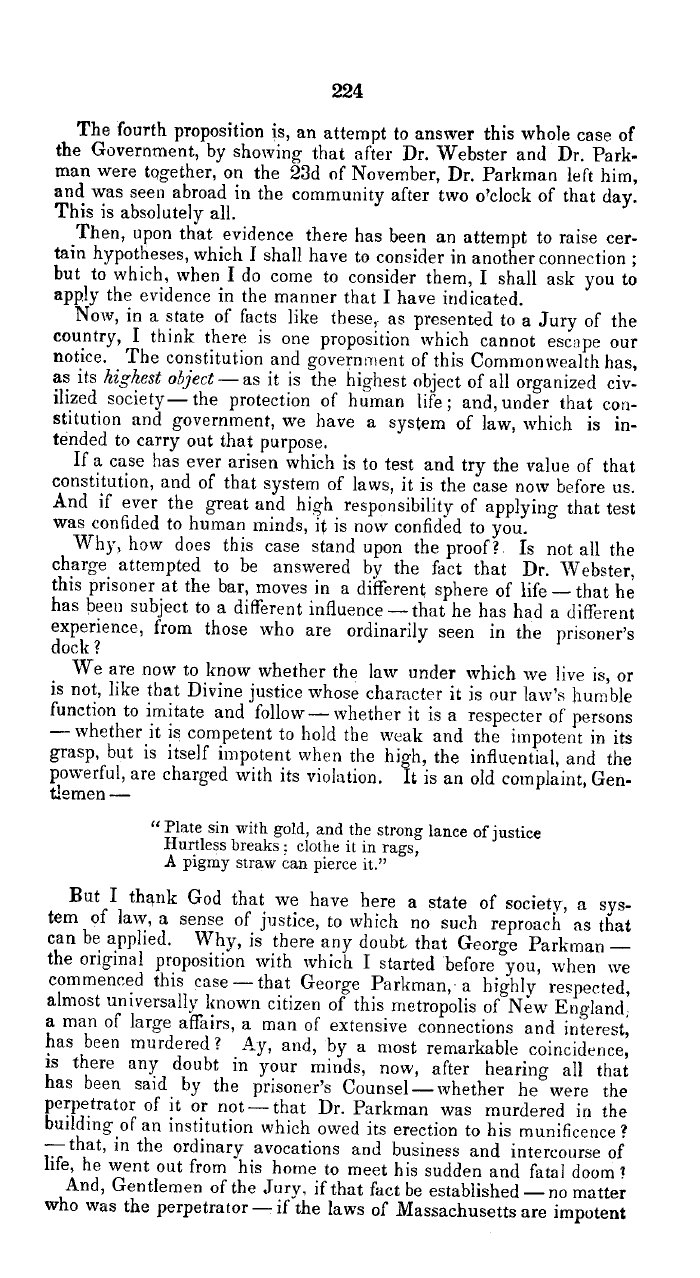|
224
The fourth proposition is, an attempt to answer this whole case of
the Government, by showing that after Dr. Webster and Dr. Park-
man were together, on the 23d of November, Dr. Parkman left him,
and was seen abroad in the community after two o'clock of that day.
This is absolutely all.
Then, upon that evidence there has been an attempt to raise cer-
tain hypotheses, which I shall have to consider in another connection ;
but to which, when I do come to consider them, I shall ask you to
apply the evidence in the manner that I have indicated.
Now, in a state of facts like these,. as presented to a Jury of the
country, I think there is one proposition which cannot escape our
notice. The constitution and government of this Commonwealth has,
as its highest object-as it is the highest object of all organized civ-
ilized society- the protection of human life; and, under that con-
stitution and government, we have a system of law, which is in-
tended to carry out that purpose.
If a case has ever arisen which is to test and try the value of that
constitution, and of that system of laws, it is the case now before us.
And if ever the great and high responsibility of applying that test
was confided to human minds, it is now confided to you.
Why, how does this case stand upon the proof?. Is not all the
charge attempted to be answered by the fact that Dr. Webster,
this prisoner at the bar, moves in a different sphere of life-that he
has beet) subject to a different influence-that he has had a different
experience, from those who are ordinarily seen in the prisoner's
dock ?
We are now to know whether the law under which we live is, or
is not, like that Divine justice whose character it is our law's ]rumble
function to imitate and follow-whether it is a respecter of persons
-whether it is competent to hold the weak and the impotent in its
grasp, but is itself impotent when the high, the influential, and the
powerful, are charged with its violation. It is an old complaint, Gen-
tlemen -
°~ Plate sin with gold, and the strong lance of justice
FIurtless breaks : clothe it in rags,
A pigmy straw can pierce it."
But I thank God that we have here a state of society, a sys-
tem of law, a sense of justice, to which no such reproach as that
can be applied. Why, is there any doubt. that George Parkman -
the original proposition with which I started before you, when we
commenced this case-that George Parkman, a highlv respected,
almost universally known citizen of this metropolis of New Engyland;
a man of large affairs, a man of extensive connections and interest,
has been murdered? Ay, and, by a most remarkable coincidence,
is there any doubt in your minds, now, after hearing all that
has been said by the prisoner's Counsel-whether he were the
perpetrator of it or not-that Dr. Parkman was murdered in the
building of an institution which owed its erection to his munificence ?
-that, in the ordinary avocations and business and intercourse of
life, he went out from his home to meet his sudden and fatal doom ?
And, Gentlemen of the Jury, if that fact be established-no matter
who was the perpetrator-if the laws of Massachusetts are impotent
|

